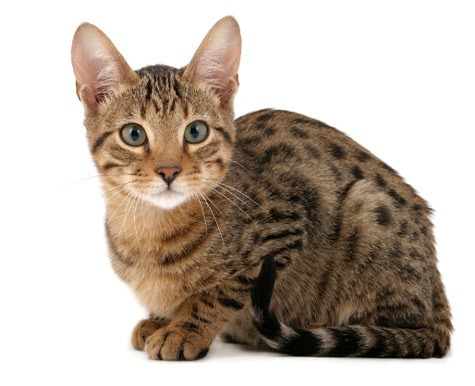
Serengeti
 Overview
Overview
Overview of Serengeti
Bred to look like wild Servals on the outside but completely domestic on the inside - Serengeti cats were created thanks to Californian conservation biologist Karen Sausman in the 1990s. But unlike the creators of the Savannah cat, which is also meant to resemble a domestic serval, Sausman decided not to use any wild cats in her breeding program and instead opted for domestic kitties only! To develop Serengeti cats, she combined Bengal and Oriental Shorthair cats and refined the mix later. Bengals contributed their solid build and bright coat color, while the Oriental Shorthair contributed its long ears, long legs, and overall sophisticated looks. The Serengeti cat's most iconic feature is their incredibly long legs - they have the longest legs of any cat breed! They are a relatively new breed but have become established enough to gain recognition at The International Cat Association (TICA) breed registry in their own right! Their official colors are smoky black with spots, black tabby, brown tabby, or silver tabby. They can weigh between 8-15 lbs, and despite borrowing their name from the beautiful region of Tanzania, famous for its wildlife reserves, the Serengeti has never set a paw in Africa!
Common Health Conditions & Recommendations for Serengeti
Hypertrophic Cardiomyopathy:
Is the most common heart disease among cat breeds. This condition causes enlargement (hypertrophy) of the heart which can lead to blood clots, mobility issues and congestive heart failure.
Recommendations for Hypertrophic Cardiomyopathy in Serengeti Cats:
Common Health Conditions & Recommendations for Serengeti
Separation Anxiety:
Serengeti cats are highly social kitties so if they are left alone for too long, they may become restless and act out.
Recommendations for Separation Anxiety in Serengeti Cats:
Common Health Conditions & Recommendations for Serengeti
Progressive Retinal Atrophy:
Refers to a family of eye diseases which lead to mild to severe vision loss. Serengeti cats may be prone to developing this condition because it is quite common amongst Bengals - one of their parent breeds.
Recommendations for Progressive Retinal Atrophy in Serengeti Cats:
 Personality
Personality
The Serengeti cat has an open, friendly, and self-assured temperament, making them excellent family companions. Serengeti cats are active, chatty, ready to play for hours, and love to climb and chase toys. These spotted kitties are known for their high energy levels and athletic prowess. Their silky coat is relatively low-maintenance and makes them look like they are shimmering from far away! Serengeti kitties bond deeply with their pet parents, so they don't do well if left alone for too long.

 USD
USD
 Canadian Dollars
Canadian Dollars
